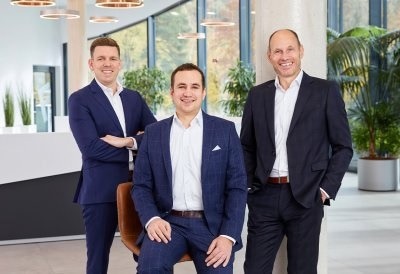Despite the tense procurement situation, the machine vision company IDS expects a positive turnover development and growth of 15% for the 2023 financial year. One reason for this is a good order situation resulting from the advancing wave of automation. In addition, IDS expects supply chain bottlenecks to improve.
 IDS Managing Director Alexander Lewinsky, Managing Partner Jan Hartmann and Jürgen Hartmann (founder and owner) (l.t.r.). Image Credit: IDS Imaging Development Systems GmbH
IDS Managing Director Alexander Lewinsky, Managing Partner Jan Hartmann and Jürgen Hartmann (founder and owner) (l.t.r.). Image Credit: IDS Imaging Development Systems GmbH
"Our big advantage is certainly that we are represented in almost all industries and are thus very broadly positioned," explains IDS Managing Director Alexander Lewinsky. "The demand for our products has increased particularly in the medical technology sector, which pleases us not only from an economic point of view. More and more IDS cameras are thus making a contribution to health promotion worldwide. In addition to resource conservation and environmental protection, this is an area of application that is close to our hearts."
Growth Driver 3D Vision
On the product side, the positive development is based on the continuing strong growth of the 3D segment. Accordingly, the portfolio will be expanded in the current year by a new, cost-optimised series for largevolume applications. "We see this segment as one of the main growth drivers," underlines Jan Hartmann, IDS Managing Partner. Secondly, in the 2D segment, last year's launch of the uEye cameras with newly developed USB3 technology platform has more than proven its worth. This means that the camera manufacturer is more supplier-independent and thus better cushions component bottlenecks. More models with this hardware technology will follow in the coming months. In addition, new cameras with high data rates and faster and larger sensors are meeting growing need, as are price-optimised models with reliable basic functions. To meet the increasing demand, IDS has developed the uEye Warp 10, which enables extremely fast clock rates and ensures particularly high quality requirements. In addition, new product variants are being added to the entry-level range in the product line, which further expands their possible uses in customer applications.
Introducing Users to Key AI Technology
The technology company is also intensively driving forward the topic of artificial intelligence. "IDS wants to make it easier for users to access this key technology and help them initiate urgently needed automation processes with easy-to-use, intelligent image processing components," emphasises IDS founder and owner Jürgen Hartmann. The opportunities offered by corresponding solutions are enormous and associated with completely new fields of application, such as transport and smart city or environment and smart farming. "With our visionpier marketplace, the first and so far only one of its kind for image processing solutions, we offer direct access to this," adds Jürgen Hartmann. "Solution providers and users can discuss solutions, develop or enhance them, use, adapt and reuse them."
Machine vision is considered a growth industry more than ever, demand and supply are increasing - despite the energy crisis and chip shortage. IDS is positioning itself in this promising market not only with innovations, but as an "enabler". "User-friendliness is above all. We want to support our customers in finding a solution more quickly and easily with the help of the 'Easy to Use' IDS ecosystem, on which IDS will focus in 2023," explains Alexander Lewinsky. On the one hand, this refers to the area of industrial cameras, where special attention will be paid to the usability of the in-house software package. On the other hand, the approach includes the intuitively usable IDS NXT cameras with artificial intelligence.
Completely Climate-Compensated
In view of the current geopolitical and climatic conditions, IDS is also increasingly committed to the topic of sustainability. As a pioneer among the fully climate-compensated companies in the industry, further measures are firmly anchored in the company's long-term goals in order to steadily reduce CO2 emissions at the Obersulm site. Most recently, the compensation of the first climate-neutral camera family, uEye CP, was updated. "We are not the only ones who feel morally obliged to keep CO2 emissions as low as possible in every area of the company. Such factors also play an increasingly important role in our customers' purchasing decisions," Alexander Lewinsky knows. "Ultimately, everyone benefits from this, producers and customers as well as our environment and society.